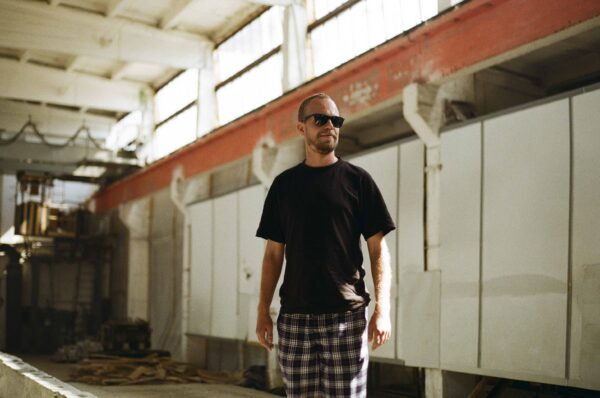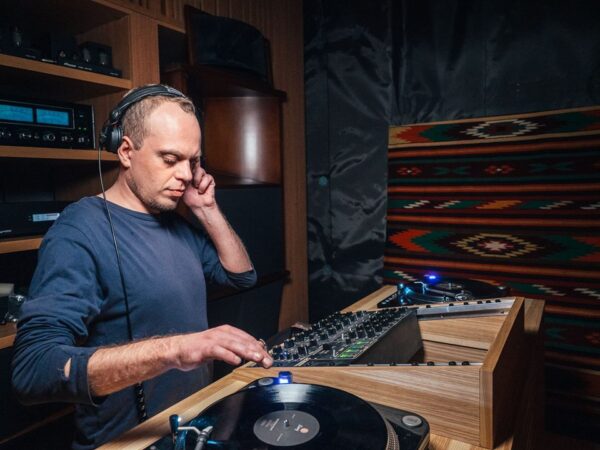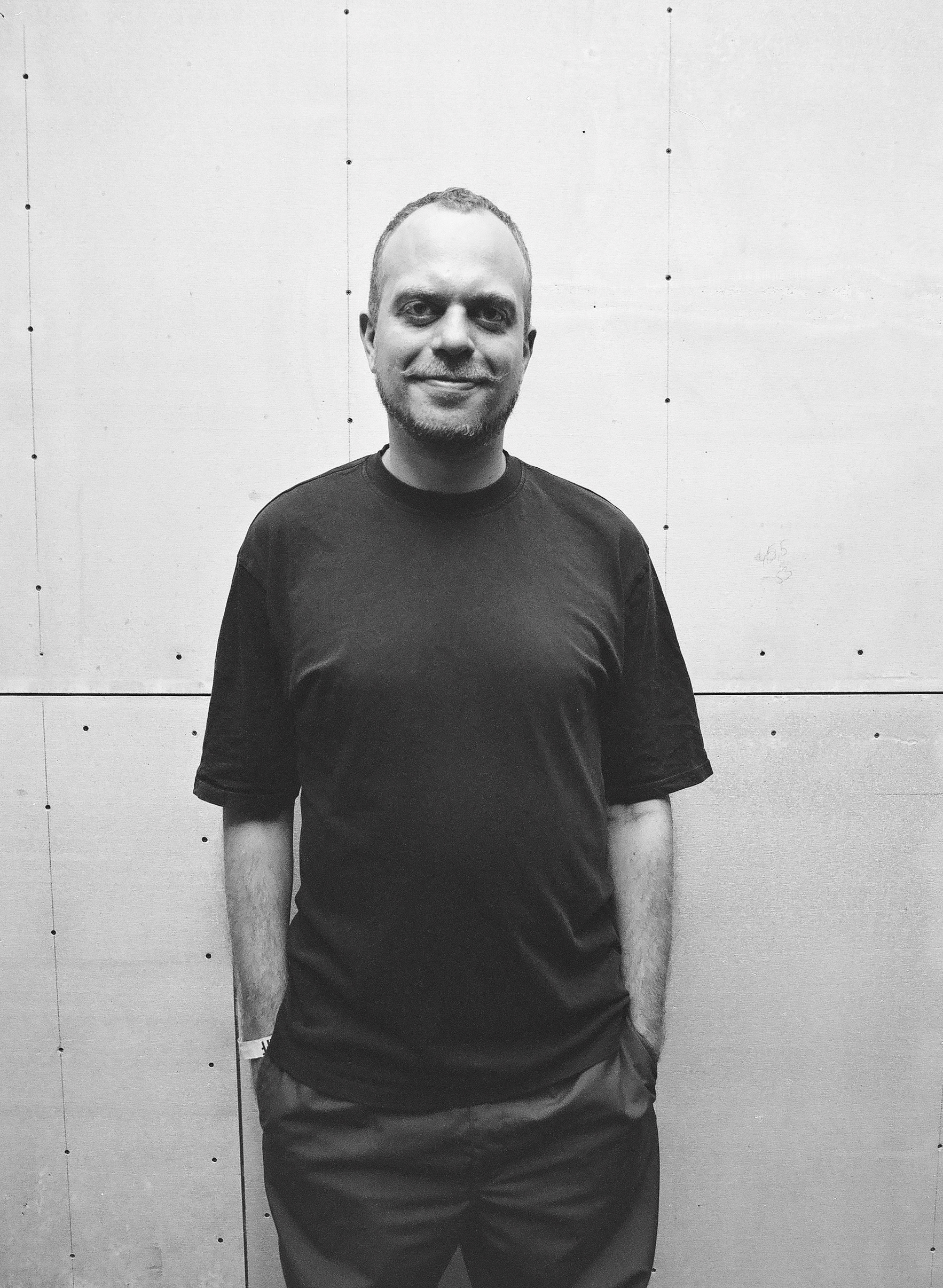Serge Jazzmate, is a rarefied phenomenon in the club music scene. The DJ and event organiser has remained a determined presence in Ukraine despite the war and in an extremely difficult and terrifying situation he has helped retain some semblance of a scene in his native Kiyv. Between the sounds of air raid sirens and Russian projectiles, Serge’s music also permeates the air, offering a glimmer of hope in sound for a scene under serious duress.
A resident and co-founder of LOW, and frequent guest at ∄ (k41) Serge Jazzmate has been a fixture on what was burgeoning scene in Ukraine since 2007. A true facilitator, he helped arrange events and parties when he was not playing sets that trip across vast musical borders. He can be found operating in that record-enthusiast/selector universe where all the attention is focussed on the music and the DJ is an enthusiast and entertainer.
Before the war broke out with the Russian invasion of Ukraine, he had also been a prominent figure appearing on lineups like Brave! Factory, Strichka and Rhythm Buro Natura as well as playing abroad in places like Berlin. His nomadic sets, moving between everything from “Brazilian bossa nova to Electro,” have become a staple at his LOW residency, which recently celebrated its 14th anniversary with an event in Berlin.
Today, the festivals are on indefinite hiatus but LOW and the spirit of the people behind the scenes, people like Serge, continue to bring some kind of momentary relief to Ukraine’s clubbing community. It’s only fleeting under the current curfew, but it’s there, an allegory to that unyielding Ukrainian spirit.
We caught up with Serge via email, and he was kind enough to give us a few moments of his precious time to find out more about the current situation and his own history ahead of his set in Jaeger’s sauna with Pavel Plastikk this weekend.
Hello Serge. Perhaps you can start by giving us a brief glimpse of what life is like in Kiyv at the moment.
Hello, Misha. People live their lives, go to work, and children go to schools and kindergartens. Of course, it is not a normal life when your country is being destroyed and filled with blood, but we have to adapt to the situation when you, your family or your neighbors can be killed by a rocket or drone in a moment in a peaceful city. It’s about every single settlement across the largest country in Europe.
This war has been going on for a year, and it seems to just be intensifying leading up to the anniversary. Can you tell us how it’s affected you personally and the toll it continues to take on the Ukrainian people?
Complex issue. The ongoing war is taking a significant toll on the Ukrainian people’s mental health, with many experiencing trauma and anxiety as a result of the violence and uncertainty. Defenders and peaceful people die daily, infrastructure and industries are being heavily damaged, and significant damage is caused to nature. We apparently have no other choice than the retreat of the aggressor’s army, otherwise Ukraine will cease to exist as an independent state. This will provoke, firstly, a previously unprecedented new wave of emigration from Ukraine, and secondly, it will unleash new wars and global changes since WW2.
A lot of your peers and fellow DJs have left Ukraine for places like Berlin. What is keeping you there and how are artists like yourself surviving there at the moment and what about the conscription?
I have the opportunity to leave the country, but I am kept by the business (I run a company), my favorite city, exceptional people and favorite clubs ∄ and Closer. To make a living only as an artist is not possible right now. I passed a medical examination and I can serve in the army but I have postponement.

I see you are playing regularly in Kiyv, even now. How are you able to maintain some kind of semblance of a scene there?
All businesses have adapted to the new reality and continue to adapt. The city somehow has managed to maintain a music scene, with local artists continuing to perform in various venues. There are even some brave djs from Europe coming to Closer from time to time which deserves huge respect. I guess there are about 3 million people in Kyiv now.
What are some of the main obstacles in putting on events and DJing in the city at the moment?
First and foremost, the curfew from 23-00, so all events end no later than 21-45, since employees need to finish their shifts and guests get home in due time. Secondly, the lack of electricity. Almost every venue has a generator that solves this issue.
What’s happening with concepts like LOW and do you see a time ahead when you can simply pick it up again where you left off?
Thanks to our friends from PRU Y RVU, we just celebrated the 14th anniversary of LOW in Oxi Club in Berlin. All our residents arrived from different countries and we picked up our two favorite dj’s who previously played LOW in Kyiv – Tako (Music From Memory) & Maurice Fulton (BubbleTease Communications). It was a truly unforgettable and amazing night full of love, music and unity. Obviously, we won’t be able to hold events at home, and we’ll probably continue to hold special parties in different countries.
Clubbing has often been an outlet for people during periods of great distress as an escape for the harsh realities. I know in Serbia for example, club culture offered people a lifeline during their time of war. Is there anything like that happening in Ukraine at the moment, or is the war simply consuming all?
Absolutely. When you live in a constant negative emotional field, in fear and anxiety, with many restrictions, music and dance positively affect the state of people. Each participant buying a ticket directly helps various units of the army, funds, etc. Most venues collect and share profits. It’s win-win. Everyone is working on ways to help our defenders in an affordable way on the home front.
You’ve been involved in club music and club culture for a couple of decades. How did you get into this music and how did you get your start as a DJ?
Music has accompanied me since childhood. When I was at school I began collecting CDs ranging from Detroit techno, Brazilian bossa nova, Trip Hop, Disco, House, Reggae, Electro, Funk. It was a collection of many thousands. Later I started collecting records on the basis of my CD collection. I bought two Technics 1210s and a Pioneer DJM 300 mixer and in 2005 started training and playing extended sets at home.
My first paid gig happened in 2007 and after that more invitations followed. By that time, I had already met my partner in crime and the best Ukrainian dj Pavel Plastikk. We started playing together, and in 2009 LOW Party was launched at Xlib Club. On a separate note, Berghain/Panorama Bar seriously influenced and inspired me when I visited it as a clubber in 2008 and dreamed of the day when I would play upstairs.
What was the scene for electronic music like there before the war?
It grew rapidly from 2014-2015, new clubs opened, the young scene developed, first-rate international electronic festivals were started such as Brave! Factory, Strichka and Rhythm Buro to name a few.
Even when Covid happened, the Kyiv clubs managed to stay afloat. A striking example of which is Brave! Factory Festival 2021, which attracted over 10 thousand visitors (with a huge proportion of foreign ravers) and a club located on Kyrylivska Street (∄), which was launched a few months before the pandemic and also gathered full planes of European tourists. Europe was in full lockdown at the time. Our economy could not afford it, so businesses worked within the existing rules and adapted to the situation without proper governmental help.
You’ve eschewed the producer/DJ paradigm. What is it about DJing that fulfills your creative pursuits and why have you avoided producing your own music?
Well, I’m a DJ and a collector. I’m happy with what I do, where I am and what moves me.
Your musical selections are quite broad with sets that can go everywhere from Disco to Techno. What is behind this eclectic approach?
It’s basically dependent on the club and the party. Sometimes I would play more straight sets, sometimes eclectic. Mixing genres came from the beginning when I started listening to the records. DJing just reflects your tastes, your mood and your understanding of the dance floor in the moment. This skill is experience, you should live them in time.

Is there anything specific that draws you to a piece of music and what is the main thing you look for in a piece of music to play out regardless of genre?
I think drama is the most important thing to achieve, regardless of genres.
What have you found people are gravitating towards today in these trying times and why do you think this style of music works so well in the current situation?
It is difficult for me to answer. Perhaps this is something other than what is being played elsewhere, like the same type of house or techno, when it is difficult to distinguish whether something has changed over the past three hours, if you understand what I mean.
Some people like 140 BPM, some people like 160 BPM. Some people just like more meaningful music where there’s a soul and emotion.
In the past, there had been some sense of collaboration between Ukraine and Russia’s Djs and artists, but I assume the war has completely broken any sense of camaraderie. Has succeeded in alienating a whole generation of Ukrainians?
I can’t answer for everyone, but in general of course, there is a very small number of artists, citizens from a neighboring country, who supported Ukraine. We keep a close eye on every artist and promoter.
What’s going to stop this war in your opinion and how can we as club- and music enthusiasts continue to help the Ukrainian people?
Those who started the war can stop it very quickly. Keep helping Ukrainian people in any possible way, keep pressure on your governments with more & more weapons and sanctions. I understand that you also suffer from the economic consequences now but it is incomparable with other consequences which could happen later.

